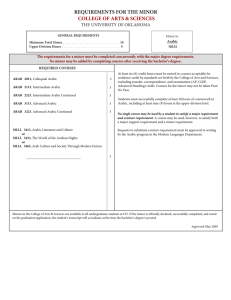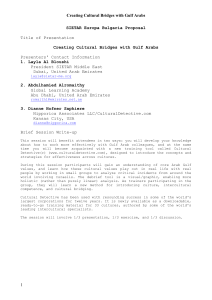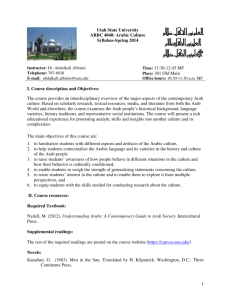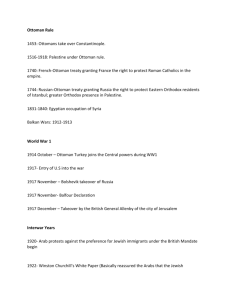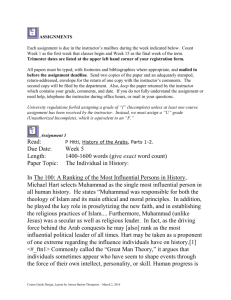if you learn nothing else about arab culture
advertisement
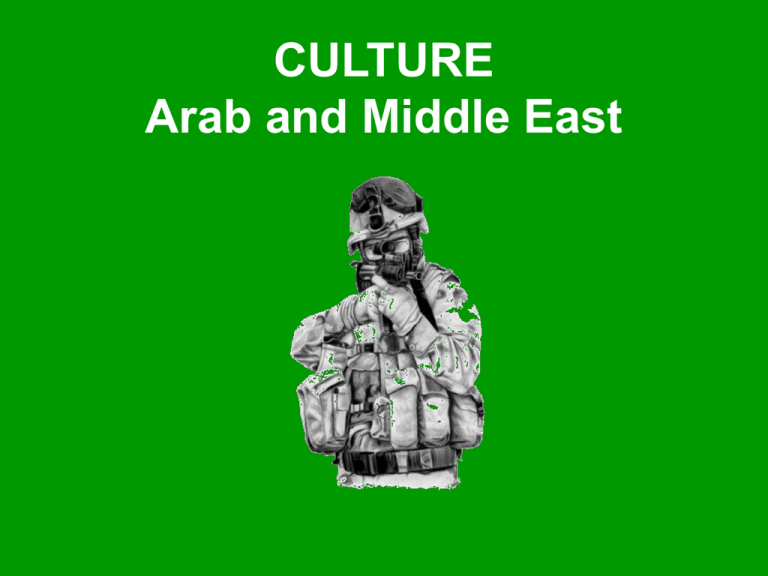
CULTURE Arab and Middle East Overview • • • • • • • What is What Mindset CALL Arab Culture (Guerrilla) CALL Mistakes to Avoid Laundry Listing Putting it All Together Naming Conventions Arabs, Middle East, SWA • • • • • • • • Arabs Persians North Africans Nubian “Jews” Turkman Tajiks Pashtun • “Arab World” • Middle East • Gulf States – (Al-Jehzeera) • • • • Southwest Asia Ottoman Empire Arabian Gulf Persian Gulf Arab and Middle East Mindset Pawns of Fate • Many Westerners see themselves as being in control of their own destiny • Many Middle Easterners believe that much of what happens to them (and others) in life is predestined and controlled by fate – Prevailing belief is that an individual’s behavior has little effect on outcomes – No “probable” or “likely,” events are anticipated or hoped for with the proviso: “insh’allah” (God Willing) • Embedded within the Arabic culture is a normative acceptance of conspiracy theories as a means of explaining the reasons behind certain events Collective Identity • Culture of most Middle Eastern and many Asian countries is oriented more toward collectivism than individualism • Individualistic cultures pride themselves on individual accomplishment and what makes them unique, special, or different from others • Collectivist cultures, however, believe personal value comes not from individual deeds, but from social standing and group affiliation – Value most about themselves not what is unique, but rather what makes them part of a larger group or collective – Ethics of responsibility centered on the greater benefit of the collective • The individual’s identity is based on his family or tribe/clan roots and the group with whom he currently affiliates. This phenomenon is captured in the saying: “Who I am is who I am a part of, and whom I am with.” Importance of Relationships • Arab culture is built on relationships and connectedness to others – Incredibly important as a source of power, comfort, and worth – Persons from collectivist cultures rarely value “alone time” and they are rarely alone – As with identity, perceptions of self-worth are influenced strongly by the perceived status and value of their social network – One’s value is defined by whom you know and who is in your network “Wasta” • A person is fundamentally defined by, and valued for, belonging – This means that the group holds great power over the individual’s behavior • In quest for personal meaning, direction, and structure a man will often suspend critical thinking and commit to a particular mosque, leader, or collective “bunch of guys” (and their ideology) that advocates militant Islam Good Impressions • Persons from Middle Eastern and Arabic cultures often prioritize their social image and the harmony of relationships over directness or sincerity – Considered impolite to disagree with someone or to refuse a request – May express insincere sentiments in order to avoid conflict – Not regarded as an attempt to deceive, but rather appropriate behavior to preserve the relationship – Consequence is that individuals develop hidden agendas to ensure connectivity to others and enhance their value – Result, it is difficult to establish trust, as is expected in the West Good Intentions • In the West, it is important to “make good” on one’s promises. – Merit is earned through action • “actions speak louder than words” • Conversely, in the Middle East, intentions matter more than actions – A person attests that they will do something that they subsequently fail to do, it is not considered a transgression, so long as the person sincerely wanted to do it or intended to do it at the time • Thus, well-intended promises and anticipated actions may not carry the same weight for the source as for the Special Agent. Shame, not Guilt • In the West, guilt and the anticipation of feelings of guilt influence the individual’s overt behavior and decisionmaking processes – Guilt is personal -- distress experienced by the individual – Mitigation usually requires “owning up” – Confessing to someone, taking responsibility for one’s actions, and possibly taking further action to correct or compensate for the offending behavior • Conversely, collectivist societies are more driven by the phenomenon of shame – Shame is the distressing emotion one seeks to avoid or has to bear for wrongful behavior – Shame is social; it is a reaction to the responses of others. – Confession acknowledges or makes others aware of the undesirable behavior, and therefore, is generally avoided. – Others’ awareness that brings about the sanction of shame Associative Thinking • Middle Eastern persons are raised and acculturated to think associatively • Westerners tend to think in a the linear, goal-oriented, structured, sequential way • Westerner telling a story about a life experience would likely do so chronologically, in a way that created a beginning, middle, and end • Associative thinkers are not bound by these conventions – “go off on tangents” or relate segments out of sequence – It may make sense in their “big picture” of what they are trying to communicate, but it can be difficult for linear thinkers to follow • Source or Subject’s thinking may appear to jump from pointto-point throughout the conversation Emotional Info Processing • Individuals from the Middle East tend to be emotional processors of information • As they take in information and experiences, they tend to organize data and events around the context of relationships and collective value, rather than by topic or category • The information tends to have enhanced value and is communicated in more dramatic terms with enhanced texture and emotion • Information may be distorted in an attempt to increase the communicator’s value to the listener IF YOU LEARN NOTHING ELSE ABOUT ARAB CULTURE Arab Culture Condensed to 15 Slides For Official Use Only Basic Arab Values • A person’s dignity, honor, and reputation are of paramount importance (honor and shame are often viewed as collective, i.e., pertaining to the entire group or family). If you shame an Arab you have shamed his entire extended family, clan, tribe, etc. • It is important to always act in a manner that will make a good impression on others. • Loyalty to family takes precedence over personal needs. • Social class and family background are the major determinants of one’s personal status. The next most important is individual character and achievement. • Arabs value conversation and long discussions. For Official Use Only Basic Arab Self-Perceptions • Everyone believes in God, acknowledges His power, and has some religious affiliation. • Humans cannot control events – things depend on God and fate. • Piety is one of the most admirable characteristics in a person. • In Islam there is no separation between church and state (some Arabs may not agree with this). • Established religious beliefs and practices are important and liberal interpretations which threaten them are rejected. For Official Use Only Reciprocity • If an Arab helps you he will expect you to reciprocate • Never openly refuse a friend’s request. • Arabs will extend many invitations – while it is acceptable not to maintain them at the same pace, it is considered rude not to reciprocate. For Official Use Only Basic Rules of Etiquette 1 of 3 • Good manners constitute the most salient factor in evaluating a person’s character (remember this point during official meetings). • Failure to shake hands when greeting someone or when saying goodbye is considered rude. Between a man and a woman, it is the woman’s choice whether or not to shake hands. • Do not slouch or cross legs on top of a table. Sitting in a manner that shows the soles of one’s shoes to another person is an insult • When standing or talking with someone, do not lean against a wall or keep hands in pockets. For Official Use Only Basic Rules of Etiquette2 of 3 • Men stand when a woman enters the room; everyone stands when a new guest enters the room at a social gathering, or when a high-ranking or elderly person enters or leaves. Men allow women to precede them through doorways and offer their seats if no others are available. • When saying goodbye to a guest, a gracious host accompanies them to the outer gate or to their car. • If a guest admires something small and portable, an Arab may insist that it be taken as a gift. Do not express admiration for something expensive. Gifts shouldn’t be opened in the presence of the donor. • Never use the left hand. For Official Use Only Basic Rules of Etiquette3 of 3 • Arabs will almost always insist on paying when out to dinner – it is appropriate to let them pay, but should be reciprocated later. • People should not be photographed without their permission. • One who lights a cigarette in a group must be prepared to offer one to everyone. • Staring at one of the same sex is not considered rude. • Most Arabs do not like to touch or be in the presence of household animals, especially dogs. • Arabs get very personal, very quickly. Do not; however, ask about female members of the family. Do not flirt with Arab women. • Do not stand or walk in front of a praying Muslim. For Official Use Only Hospitality • • • • 1 of 2 Generosity to guests is essential for a good reputation. A drink will quickly be offered. Accept and hold the cup with right hand. Not to accept the drink is consider ill mannered. If a guest arrives while others are eating, they will offer to share, but an unexpected guest should feel free to decline. Ahlan wa Sahlan or Marhaba means “welcome” and will be stated when a guest arrives and usually several times throughout the visit. For Official Use Only Hospitality 2 of 2 • Guests often are given a seat of honor and will be asked frequently if they are comfortable. • Even under inconvenient or unexpected circumstances, a guest would never be refused entrance. Exception being if a woman was at home alone and the guest was a man. In this situation, the guest should refuse to enter, regardless of how soon the male member of the household is expected to be home. • Many Arab homes have a separate room for receiving guests, called a salon. For Official Use Only Meals • • • • • 1 of 2 Dinner should be planned for a late hour. After the evening prayer. Invitations are almost always verbal and frequently spontaneous. Guests should arrive early for conversation before the meal. Arabs will present abundant amounts of food to display generosity and esteem for the guests. Water may not be served until after the meal. Some people consider it unhealthy to eat and drink at the same time. For Official Use Only Meals 2 of 2 • The guest is expected to show admiration and gratitude for the food. Eat sparingly on the day you are invited because out of politeness you will overeat! Alhamdu lillah means “Thanks be to God” – say this when you have had enough to eat. • When leaving the table, it is customary to say sufra dayma – “may your table always be thus”. • When guests express an intention to leave, the host will always encourage them to stay – consider this ritualistic – you will not offend by leaving. For Official Use Only Official Meetings 1 of 2 • A good personal relationship = a successful meeting. • At the beginning of meetings, time is set aside for light conversation. Inquire about illness and other personal matters (weddings, vacation plans). Wait for them to start talking business. Arabs don’t like to be hurried or pressured into an agreement. • Arabs mistrust people who do not appear to be sincere or who fail to demonstrate an interest in them personally. • Do not mistake good manners for an indication of your success. • A noncommittal reaction is not negative or positive – be patient. • Inshallah means “If God Wills”; in other words, they may express good intention, but they are leaving a way out. For Official Use Only Official Meetings 2 of 2 • Often intermediaries are used to represent another. In situations of conflict, it is particularly important to use an intermediary for whom the person you are in conflict with holds in high regard. • Most Arabs are habitually late. Therefore, a person who arrives late and has kept you waiting may not even realize that you have been inconvenienced. Deadlines are often not met – expect delays and be patient • A positive response is merely a declaration of intention and an expression of goodwill. • Arabs often disregard “no smoking” signs and will often disregard you if you ask them to refrain from smoking. For Official Use Only Conversation • Quickly determine social status. Then treat them with the respect due for their status. • Never omit greetings of “Good morning/afternoon, how are you?” etc. • “Do this for my sake” attached to a request for a favor implies indebtedness. • Importance is placed on direct praise for strong character or a job well done. Criticism is taken very personally, so it is important to phrase it carefully. Do not give criticism in front of others. Begin with the good points and be sure to include your high regard for them as an individual. • Do not discuss politics or religion. Stick to safe topics, such as the Arabic language, literature, poetry etc. For Official Use Only Gestures • • • • • • 1 of 2 Moving the head slightly back and raising eyebrows = no Moving the head back and chin up = no Moving chin back slightly and making a clicking sound = no After shaking hands, placing the right hand to the heart or chest = respect or sincerity Holding right hand out, palm downward, and opening and closing = come here Right hand out, palm downward, and move as if brushing something away = go away For Official Use Only Gestures 2 of 2 • Right hand out, palm upward, closing hand half-way and holding it = give it to me • Right hand out, palm downward, moving it up and down slowly = quiet down • Right hand out, palm upward, touching thumb and fingertips together and moving hand up and down = calm down; be patient • Holding right forefinger up and moving it from left to right quickly several times = never • Right hand out, palm downward, then quickly twisting the hand to be palm upward = What? Why? For Official Use Only ADDITIONAL LEARNING RESOURCES • Cultural Awareness Training University of Military Intelligence: the Army Proponent for Cultural Awareness Training http://www.universityofmilitaryintelligence.us/main.asp • Language Training Resources Various language Training Aides/Handbooks http://oef.monterey.army.mil Arabic Online Training: http://www.lingnet.org/language/default.asp For Official Use Only 10 ARAB CULTURAL AWARENESS MISTAKES TO AVOID For Official Use Only All Muslims Are NOT the Same About 10% of all Muslims are Shi’a. They are in the majority in Iran, Iraq and Bahrain. Iran, a non-Arab nation (i.e. they are Persian not Arab), has the largest Shi’a population. Osama Bin Laden (a Sunni) dislikes Shi’a Muslims nearly as much as he dislikes Westerners. Many of the Sunni extremists/Jihadists in Iraq are followers of the Wahabbi sect of Islam, but not all followers of the Wahabbi sect are terrorists. Bottom line: Arab culture is diverse and complex. Extend basic human dignity whenever possible and where the situation permits. Don’t condemn every Sunni as a terrorist, every Shi’a as a pro-Iranian, Fundamentalist or every Pashtun as a member of the Taliban. The U.S. needs all Muslims in Iraq and Afghanistan to work together despite past differences; many have learned to do so already. If you rely on bias and bigotry as your compass, versus taking the time to learn how groups in your local area function, you will never understand the culture. Last, use common sense and observe the “Golden Rule.” This does not mean you are soft or weak; it is a sign you are becoming culturally aware. For Official Use Only Intimidation vs. Humiliation When entering/searching a home, do not man-handle the senior male of the household in front of his family unless it is necessary (i.e. put him face down on the ground with a boot in his back). In this way you have dishonored him in front of his family. NOTE; If the individual is a threat, do whatever is required to control the situation. When in doubt, err to the side of security. This does not mean you cannot detain or question him forcefully. However, the simple act of allowing him to speak “like a man” for his family, versus humiliating him in front of them, has proven more effective and produces more cooperation. The average Iraqi family knows you (the American Soldier) are bigger, stronger and have more fire power. They are also unusually familiar with the power of intimidation. Therefore, they will respect your power and cooperate with you because of your power as long as you do not humiliate them. Once you humiliate them, you become a sworn enemy. Once humiliated, an Iraqi must get revenge in order to regain his honor. For Official Use Only Misinterpretation of Arab honor Honor, in the Arab context, does not translate clearly to the American (esp. the American Soldier’s) definition. An Arab relates honor to his identity, self-esteem and position of respect within his Family, Clan and Tribe. Honor is to be defended at all costs. The American view of honor is “my word is my bond” and “I will not lie, cheat or steal.” Given the Arab definition, an Arab WILL lie, cheat and steal to protect his honor. For example, an Arab will promise things he can not possibly deliver, because he feels to admit this shortcoming or inability would damage his honor and that he would lose face among all observers. Keep this in mind if you need a firm commitment on anything. For Official Use Only Use Of Euphemistic Speech. When speaking with Arabs, keep in mind that they believe that words have power. Arabs shun speaking about unpleasant things out of fear that negative speech compels negative results. Also, they will use euphemisms when discussing the plight of others. For instance, say a mutual acquaintance is ill and near death. Should you inquire about recent news he will likely respond, “he is well, but a little tired.” In an operational situation, check the facts after being briefed by an Arab soldier because he may be sugar coating a bitter pill. For Official Use Only Understanding and Respecting Seniority System The head of the family or clan is normally the oldest male. When he dies or becomes incapacitated, his place will likely be taken by his oldest son or one of his brothers. When a son succeeds his father as family head, he thereby gains authority over his mother. Bottom line, if the senior male is absent, defer to the oldest present (NOT the senior women). For Official Use Only Interaction With Arab Women Women typically have a private area in the household separate from men. When possible, female Soldiers should be used to search these areas, if only as a sign of respect. An alternate course of action, if there are no female Soldiers available, is to allow a male family member to observe the search. OTHER THINGS NOT TO DO: Do not shake hands with an Arab woman unless she offers her hand first, or if you are a woman. Do not flirt, hit-on, touch, hug or talk in private with women. It could endanger their safety! Do not talk in public to professional Arab women unless it is business related. Do not try and engage a woman in conversation unless you have been formally introduced. Do not stare at women or maintain eye contact. Do not ask an Arab questions about his wife or other female members of his family. For Official Use Only Wearing Sunglasses when speaking to Arabs Do not wear dark colored sunglasses when speaking, and especially when negotiating with an Arab. He will instantly assume you are trying to lie to him or hide your true intentions. If there are women present, they will assume you are staring at them. One of the reasons Arabs stand so close to people in which they are speaking is because they want to look at your eyes and see how you respond to their statements. To wear sunglasses inhibits a large part of their non-verbal communications skills. For Official Use Only Spitting Spitting (usually associated with chewing tobacco or chewing gum use) is considered extremely rude and unclean. When talking, interacting or being observed by Arabs, refrain from spitting on the ground. For Official Use Only Hand Over The Heart Versus Finger To The Eye. When affirming a commitment or guarantying to deliver on a promise, it has been observed that when an Arab gestures with a finger to his eye or facial area he is generally more likely to follow through on his commitment. When making this gesture, the Arab is saying, “it’s my obligation.” This is not to be confused with the “thank you” gesture described below. Americans seem to intuitively view the “thank you” gesture as a sign of commitment, similar to “cross my heart.” This is not the case and should not be confused. “It’s my Obligation” - The gesture of placing the right hand or its forefinger on the tip of the nose, on the right lower eyelid, on top of the head, on the mustache or beard has the meaning of "it’s in front of me, I see it or it’s on my head to accomplish." “Thank You” - Placing the palm of the right hand on the chest, bowing the head a little and closing one’s eyes general means "Thank You" (in the name of Allah). For Official Use Only Respect For Muslim Religious Practices When possible, stop what you are doing and be respectful of the Salat (routine prayers). If indoors, stay there until the Salat is complete. If you must be out and about, refrain from standing directly in front of any Muslim in a prayer position. Conversely, do not allow Muslims to use their religion against you. Do not allow a Muslim to get out of an incriminating line of questioning because he insists it is time for prayer. If one misses a prayer it is not the end of the world, they can make it up later. Muslim teachings explain that Allah understands the situations people find themselves in. Be respectful of religious fasting periods (not just during Ramadan). It is considered very bad manners to eat, drink, or smoke in front of someone fasting! In some Muslim nations, westerners can be arrested or deported for this. For Official Use Only ADDITIONAL LEARNING RESOURCES • Cultural Awareness Training University of Military Intelligence: the Army Proponent for Cultural Awareness Training http://www.universityofmilitaryintelligence.us/main.asp • Language Training Resources Various language Training Aides/Handbooks http://oef.monterey.army.mil Arabic Online Training: http://www.lingnet.org/language/default.asp For Official Use Only Key Considerations Considerations • • • • Arab Israeli Conflict Islam as a “Prism” Proxemics Attempt to Exploited All – Who you see – Who sees you with who?! • Wasta Considerations • Conspiracy Theorist – Heard, read or see it = Believe it • Women – Wives – Girlfriend – Daughters • The “Family Business” • Diwaniya and Mahjlis Considerations • The Circle of Love – Loyalty Model Understanding Middle Eastern Naming Conventions James R. Richards, B.Comm., LLB BSA Compliance Officer Director, Financial Intelligence Unit FleetBoston Financial Group, Boston, Massachusetts Presentation for the Practising Law Institute New York, New York January 23, 2002 The Arabic language is divided into three groups: • Classical written Arabic (used in the Koran); • Modern Standard Arabic (MSA, a modern version of classical written Arabic used in newspapers and textbooks); and • Spoken, colloquial, or dialectic Arabic The Arabic alphabet consists of 16 characters which, when combined with one to three dots placed above, below, or beside a character, form 28 signs or letters. The Arabic alphabet is made up entirely of consonants ... Therefore, Mohammed is written in Arabic as mhmd... That is why we have so many different spellings of Mohammad, Mohamad, Mohammed, Muhammed, etc ... Arabic words are written and read right to left, top to bottom. Arabic numbers are written left to right. The first three letters of the Arabic alphabet are ‘alif, baa’, and taa’. alif-baa-taa – along with “alpha beta” from ancient Greek, give you the origins of the english word “alphabet.” Why are there different spellings for certain words? eg., Koran …. Quran eg., Osama …. Ussama eg., Saddam Hussein …. Tsaddam Hussein There are two systems of converting Arabic into English, known as “systems of transliteration” Almost all nouns and the ten forms of verbs are built around a stem or root or three consonants … called the “triliteral root system” The root “s l m” means “peace” … Islam, Muslim, Salaam The name Mohammad Al-Ghamdi has at least 56 different spellings And none of those 56 will enable you to identify the person! Arabic names must have 4 parts - first name, two generational names, and a family, village, or descriptive name ... Osama bin Laden? Or Ussama bin Mohammad bin Awad bin Laden He is known as Ussama, son of Mohammad, grandson of Awad, great-grandson of Laden Abu, Ibn or bin, and Abd. Three key Arabic “names” … These words mean Father, Son, and Slave, respectively: Abu Ibrahim means Father of Abraham … Ibn Mohammad means Son of Mohammad, and Abd Allah or Abdullah means, literally Servant of God Classical Middle Eastern names require at least four components. These are broken down into six general categories ... 1. Honorific Name (kunya or agronem) - as the father or mother of. Often reserved for the eldest son. eg., abu Da'ud (Father of David) or Umm Salama (Mother of Salama). 2. Personal Name (ism) - common: Muhammad (Mohammed), Ibrahim (Abraham), Hasan, Ahmad. Rarely used socially, then only if the person is famous. 3. Descriptive Name (lakab or cognomen) - usually religious, relating to nature or some admirable quality the person has or would like to have. eg., 'Abd Allah (Servant of God, often written Abdullah), Harun Al-Rashid (Aaron the Rightly-Guided). 4. Patronymic Name (nasab or lineage) - denotes the pedigree, as the son or daughter of a certain person. eg., ibn 'Umar (son of Omar) or commonly spelled "bin" Umar (as in Osama bin Laden). Usually limited to three generations. 5. Geographical or Tribal Name (hisba or nisba) - derived from the place of residence or birth or origin of the family by using the prefix al or el and the suffix i, eg., Yusaf al-Isfahani (Joseph of Isfahan) or Ahmed Alghamdi (Ahmed of the Tribe of Ghamd). 6. Occupational Name or Nickname (laqab) - derived from a person's trade or family history, eg., Muhammad al-Hallaj (Mohammed the Cotton Weaver) or by a nickname bestowed posthumously or during the person’s lifetime, either as an honorific name or an insult or distinguishing feature. A great name using the laqab, or nickname is … Amr ibn Bahr al-Basri al-Jahiz, a famous Muslim poet. Known to most simply as al-Jahiz, his name actually means “Amr, son of Bahr from the Basr region, also known as Amr The Google-Eyed!” One of the first OFAC lists includes the name Abdullah Ahmed Abdullah with an alias “Abu Mariam.” Mariam is a female name; adding Abu makes the alias into an insult, as a man will never be called “Father of” a girl. To do so is to insult the man, implying he is effeminate or weak Putting in Perspective USMC No Cultural Training Expectation Management Exuberance/ Idealism/Mirror Imaging • Steep learning curve = mistakes • Frustration destroys relationships • Training achieves Awareness Disappointment/ Confusion Cultural Understanding Coping/ Learning Cultural Awareness Frustration/ Anger Deploy Half-Way Awareness/Understanding Mission Failure? Re-deploy It’s never this simple, but our perceptions are guided in this direction… FRIEND NEUTRAL ENEMY • Trusted • Non-threatening • Not trusted • Same goals • Innocent • Opposite goals • Same intent • Not important • Opposite intent • Same concerns • To be protected • Must be defeated • Same mission • Trustworthy? • Reliable Pitfalls of the Standard Approach • Most groups and people don’t fit neatly into categories: – Outlook, attitude, and actions are not static – Same actor may commit friendly, enemy, neutral acts on the same day • The act of “categorizing” can alter actions and perceptions: – If you call someone “enemy,” they perceive you the same – The term “enemy” precludes many alternate approaches – Calling someone “friend” blinds us to deceit • Categories prevent us from thinking “outside the box” – Do we consider how to co-opt an “enemy?” – Are we sufficiently wary of friends and neutrals? Who is an enemy, who is a friend? Case Study: A former Iraqi military officer was conducting ambushes against U.S. forces, leading to the death of a company commander. This Iraqi officer was a former regime stalwart, Ba’ath Party official, and a Special Forces commander with a reputation for extreme violence. He was eventually captured and served time in Abu Ghraib before being released on a technicality. He probably went back to working with the insurgency and conducting ambushes after his release. Enemy, right? Who is an enemy, who is a friend? The rest of the story: This officer was a prominent tribal member and leader, and a trusted friend of many local tribal figures. He was unanimously chosen as the leading candidate to take over an Iraqi National Guard unit. After much debate, he was selected, inducted, and placed in command of a large ING unit with the approval of the central government. The new job gave him a steady paycheck, a renewal of his sense of honor, a position of influence, and a feeling that he could help shape the direction of his country in a positive way. He worked closely with the same U.S. units he was fighting just weeks before, and was a somewhat effective commander. He was always carefully watched and mentored because of his background. Friend, or just person to be influenced? Focus on actions rather than categories SUPPORTIVE NON-HOSTILE HOSTILE • Assist mission • Allow mission • Oppose mission • Economy of force • Non-violent • Violent or criminal • Financial aid • Non-intrusive • Intrusive, harmful • Provide info • May provide info • Divert resources • Provide no info Same group/person may act across spectrum on same day What do we have to do to push from here: SUPPORTIVE NON-HOSTILE HOSTILE To at least here: SUPPORTIVE NON-HOSTILE HOSTILE - Every actor can be coerced to non-hostile action… - …and kinetic action is the most extreme form of coercion - Actions are fluid – constant pressure needed to “push left” Maslow’s Hierarchy of Needs What motivates people to act? Long-Term FUTURE Self-Actualization Needs Personal growth and fulfillment Esteem Needs Achievement, status, responsibility, reputation… Outlook and Impact on Decisions Most Americans Belongingness and Love Needs Family, affection, relationships, work group… Safety Needs Protection, security, order, law, limits, stability… Short-Term URGENT Biological and Physiological Needs Air, food, drink, shelter, warmth, sex, sleep… Most Iraqis


